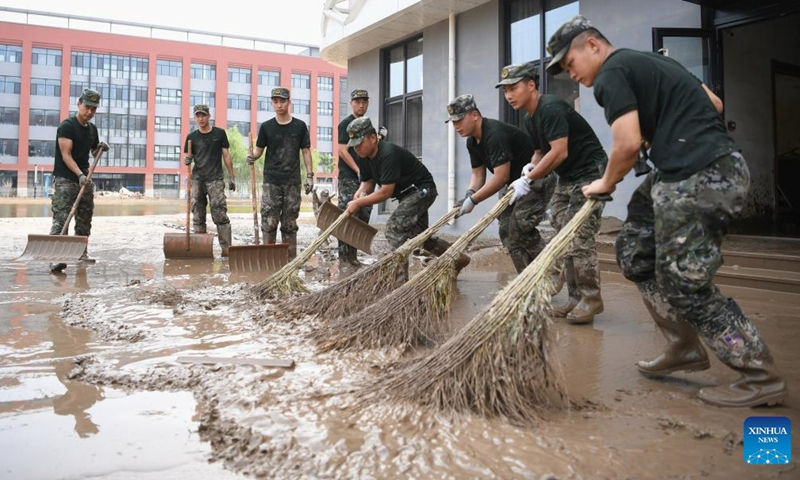Stronger supervision of funding required in post-flood recovery

Members of the armed police force clean up sludge left after the flood caused by rainstorms brought by Typhoon Doksuri at the teaching building of a high school in Zhuozhou, north China's Hebei Province, Aug. 10, 2023.(Photo: Xinhua)
As flood-hit regions in North and Northeast China mobilize all efforts to restore production and people's normal lives, China's top disciplinary watchdog on Tuesday called for strengthened supervision and inspection of post-disaster relief funds to prevent misuse and ensure reconstruction efforts are carried out smoothly and efficiently.
Since the end of July, Beijing, Hebei, Tianjin, Jilin, Liaoning, Heilongjiang, and other regions that had been severely affected by unprecedented heavy rainfall have seen significant progress in flood control and disaster relief.
In Beijing, efforts to clear the Yongding River channel in Mentougou, one of the worst-hit districts, are in full swing. Next, relevant departments are set to survey flood traces and work on assessments of future flood prevention in order to develop a river channel restoration plan.
Given that nearly 80 percent of the population in Mentougou was affected by the downpours, with 40 villages in need of a reconstruction, the district has dispatched more than 100 industry experts and designers to these villages to carry out a comprehensive survey of post-disaster planning, media reported.
The Chinese capital has vowed to basically restore all infrastructure affected by the flood within one year and promote all-round advancement of facilities in three years.
In neighboring Hebei Province, robotic vehicles have been deployed for dredging work, and some 15,000 agricultural technicians were organized to assist farmers in production recovery such as pest control and draining operations.
The province vowed to complete its reconstruction work in two years, local officials said at a press conference earlier in August.
With post-disaster reconstruction work steadily underway, all levels of disciplinary departments must shoulder their responsibilities in strengthening supervision and inspection of relief fund distribution, so as to ensure the post-disaster recovery and reconstruction is conducted in an efficient manner, China's Central Commission for Discipline Inspection (CCDI) said in a notice published on Tuesday.
The notice urged governments in the affected areas to promptly repair damaged infrastructure such as transportation, communication, and power supplies, and expedite the resumption of business and the remediation of farmland to minimize losses.
They should also accelerate the restoration of public facilities in hospitals, nursing homes and schools, ensuring that students can return to school on time.
Damaged houses should be repaired or reconstructed as soon as possible, so that the affected population can return home or move into new residences before winter, the CCDI notice said.
The notice was released following a report published by the audit office of Central China's Henan Province in late July. The report revealed a series of misappropriated or inefficiently utilized relief funds allocated to the province after the catastrophic flooding in the summer of 2021 that resulted in nearly 400 deaths and economic losses of more than 120 billion yuan ($16.4 billion).
The report audited 44 severely affected counties in Henan and identified misspending of over 9 billion yuan of reconstruction funds and the improper disposal of some 10 billion yuan of non-performing assets by 41 banks in relation to the disaster.
In light of the misconduct in Henan, which drew anger and criticism from the public, the CCDI urged all relevant departments in North and Northeast China to conscientiously carry out disaster assessment and reporting work, and ensure transparency, efficiency and accessibility of the funds.
They should also closely monitor data collection work and strictly prevent falsification of disaster losses and fraudulent claims, as well as corruption, embezzlement, and diversion of funds as the funds are distributed.
At the same time, authorities will resolutely address the problems of formalism and bureaucracy in post-disaster recovery work, holding accountable those who fail to act, or act slowly or improperly.
The relief funds should also focus on fixing loopholes that were exposed during this disaster, such as weaknesses in river basin management, the flood control engineering system and the overall flood prevention capacity in the northern and northeastern regions, experts said on Tuesday.
Ma Jun, director of the Beijing-based Institute of Public and Environmental Affairs, told the Global Times that special care should be given to the flood detention areas, which played a big role in flood mitigation but have been put under tremendous pressure and challenges. These areas need to be properly drained and repaired as soon as possible as many are still living there.
Meanwhile, Ma said China needs to reevaluate the overall risks of natural disasters against the backdrop of a changing climate. Regional planning and urban planning should also be adjusted in accordance with the reevaluation, especially low-lying areas prone to frequent flooding.
Photos
 View of Great Wall at starry night in N China
View of Great Wall at starry night in N China Groom in C China's Luoyang picks up bride with electric moped fleet
Groom in C China's Luoyang picks up bride with electric moped fleet Small railway station in N China's Inner Mongolia attracts throngs of tourists
Small railway station in N China's Inner Mongolia attracts throngs of tourists 'Space suit'-clad tourists immerse themselves at extra-terrestrial-like landscape in China's Inner Mongolia
'Space suit'-clad tourists immerse themselves at extra-terrestrial-like landscape in China's Inner Mongolia
Related Stories
- China's flood-affected regions step up reconstruction efforts
- China strengthens flood relief in Haihe River Basin
- China steps up flood relief efforts, minimizing impact on agriculture
- China to ensure disaster-hit residents can return home soon
- China allocates more funds for disaster relief work
- Relocated villagers in Jinghai District of China's Tianjin return home as flood recedes
- Top leadership hails efforts in flood control
- Flood-affected villagers return home in China's Tianjin
- CPC leadership arranges work on flood prevention and relief, post-disaster reconstruction
- NE China's Shulan expedites recovery of production and daily life after heavy rainfall
Copyright © 2023 People's Daily Online. All Rights Reserved.





